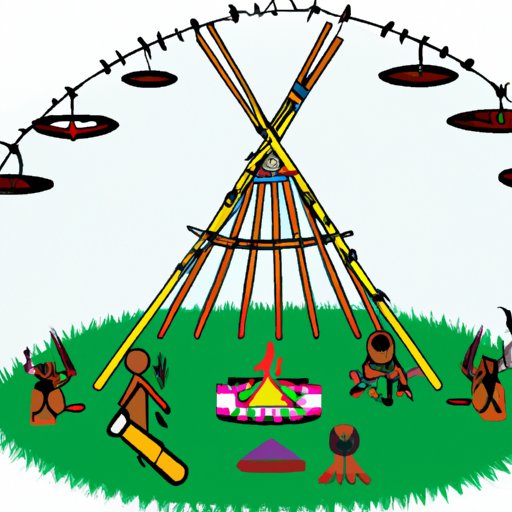Introduction
Iroquois culture is a unique and influential part of North American history and society. The Iroquois are a confederacy of six Native American tribes who lived in what is now the northeastern United States and parts of southern Canada. This article will explore the history and impact of Iroquois culture, as well as its traditional values, beliefs, and practices.
Exploring the History and Impact of Iroquois Culture
The origins of Iroquois culture can be traced back to the 11th century. At this time, five Native American nations – the Mohawk, Oneida, Onondaga, Cayuga, and Seneca – formed a confederacy known as the Haudenosaunee or “People of the Longhouse.” This confederacy was later joined by the Tuscarora nation in the 18th century. The Haudenosaunee developed a strong sense of collective identity and worked together to protect their territory from other tribal nations.
The Haudenosaunee had a complex and sophisticated social structure and government. Each nation was divided into clans, which were led by chiefs. These chiefs formed the Grand Council, which was responsible for making decisions on behalf of the entire confederacy. The council was made up of 50 members, with each nation represented by nine people.
The Iroquois Confederacy had a significant influence on other Native American nations, particularly those in the Great Lakes region. They shared their political system, which provided a model for other tribal nations to form their own confederacies. Their language, customs, and religious beliefs also spread among other Native American tribes.

An Overview of Iroquois Society and Values
The Iroquois had a hierarchical social structure based on clans. Each clan was headed by a chief, who was responsible for making decisions on behalf of the clan. The chiefs were also members of the Grand Council, which was responsible for making decisions on behalf of the entire confederacy. The clans were matrilineal, meaning that descent and inheritance were passed down through the mother’s line.
The Iroquois valued cooperation and consensus. They believed that all decisions should be made with the consideration of the whole community in mind. They also placed a great emphasis on family and kinship, and viewed all members of the confederacy as relatives. Other important values included respect for nature, honesty, and generosity.
The Role of Women in Iroquois Society
Women held a prominent role in Iroquois society. They were responsible for many tasks, such as planting and harvesting crops, gathering food, and caring for the home. They were also the primary caregivers for children and elders. In addition, women had the right to own property and could hold positions of authority in the clan.
Women played an important part in Iroquois culture and society. They were seen as a source of strength and wisdom, and their opinions were respected. Women were also responsible for passing down traditions and customs to younger generations.

The Art and Crafts of the Iroquois People
The Iroquois are renowned for their art and crafts. They created beautiful pottery, beadwork, and woodworking pieces. Pottery was often decorated with intricate designs, while beadwork was used to create clothing and jewelry. Woodworking was used to make furniture, tools, and weapons.
The Iroquois were also skilled at basket-weaving and weaving cloth. They used natural materials such as tree bark, reeds, and grasses to create baskets and mats. They also used animal hide and fur to make clothing and blankets.

Traditional Iroquois Religious Beliefs and Practices
The Iroquois had a spiritual belief system that was based on the idea of the Great Spirit. They believed that this spirit created the world and was responsible for all of the good and bad that happened in it. The Iroquois also had a creation story, which explained how the world came to be.
Rituals and ceremonies were an important part of Iroquois culture. These rituals were used to give thanks to the spirits, ask for guidance, and celebrate special occasions. Festivals were also held to mark the changing of the seasons and the cycle of life.
How Iroquois Culture Has Evolved Over Time
The arrival of Europeans in North America had a major impact on Iroquois culture. Many of their traditional beliefs and practices were suppressed or outlawed by the colonists. The Iroquois were also forced to relocate to reservations, where they were expected to adopt European customs and values.
In recent years, the Iroquois have adapted to contemporary life while still maintaining their traditional values. They have embraced modern technology, education, and business opportunities, while continuing to practice their cultural beliefs and customs.
Conclusion
Iroquois culture is an important part of North American history and society. Its influence can be seen in the social structures of other Native American tribes, as well as in the art and crafts of the Iroquois people. This article has explored the history and impact of Iroquois culture, as well as its traditional values, beliefs, and practices. It has also looked at how the culture has evolved over time in response to European colonization and contemporary life.
(Note: Is this article not meeting your expectations? Do you have knowledge or insights to share? Unlock new opportunities and expand your reach by joining our authors team. Click Registration to join us and share your expertise with our readers.)
